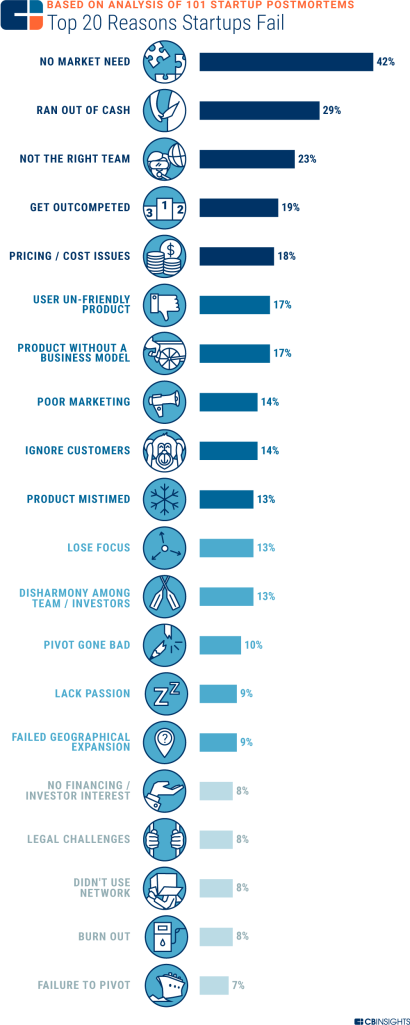

Your “good idea” isn’t necessarily a good business…
source link: https://neilcocker.com/your-good-idea-isnt-necessarily-a-good-business/
Go to the source link to view the article. You can view the picture content, updated content and better typesetting reading experience. If the link is broken, please click the button below to view the snapshot at that time.
Your “good idea” isn’t necessarily a good business…
Over the last few years I’ve mentored hundreds of startups and founders, most of them in the early-stages of building their business. The single most common issue I see is that founders don’t make a distinction between a good idea and a good business. They think that because there’s a problem, then inevitably people will pay for a solution to that problem.
As the number one reported reason that startups fail is “no market need” I wanted to write something that addressed this, and give an example I’ve been using for a while. Why are nearly half of us wrong that we’re building something that people actually want?

I stood in front of an audience of a few hundred people. “Raise your hand if you have ever spilled a drink?”. Inevitably, a few hundred hands went into the air. “And how many would like to never spill a drink again?”.
Every single hand stayed up.
“So” I continued, “we can assume from this reasonable sample that every person on the planet has spilled a drink, and would be interested in a product that stopped them doing it again, right?”
On the face of it that feels like a pretty compelling problem to tackle. Based on that sample it is a pain that every adult on the planet has experienced, so it’s not unreasonable to suggest that there’s a vast amount of people who would pay for a solution.
And it’s the thought process that most would-be entrepreneurs have when they come up with a new business idea. They have a bias towards all the confirmation that they see around them, telling them that it *must* be a business that everyone needs. I’ve done it myself more times than I’d like to admit.
I then ran the audience through 5 or 6 different potential products to solve this issue that billions of people experience several times a year. They included:
- An adjustable cap that can fit on the top of a wine glass, pint glass, mug etc, like toddlers have.
- An app that you open when you start drinking, and it sends you regular reminders not to spill your drink.
- A heavy weight that you attached to the bottom of every mug or glass that you drink from, ensuring that it’s very difficult to knock over.
They are all terrible ideas, of course. Or, to be more precise, they are all products that nobody would buy or use. But I challenge you to come up with a solution that *would* solve this problem and, crucially, also become a successful business.
My point is that there’s a big difference between a good idea and a good business. And the inability to acknowledge that fact is probably the biggest issue I’ve found when working with countless early stage entrepreneurs. They all fall in love with their solution, and not the problem. And whether people will pay for that solution. All the time that you are focused on YOUR solution, you are missing out on the fact that there may be a better solution just next door.
In other words, most of them are solving a problem that is not big enough to cause a change in behaviour (of either usage or payment) in their potential customers. And their emotional attachment to their solution blinds them to that fact. I’ve recently developed a simple process to help validate your business, and hugely reduce the risk of launching.
We each knock over a drink every now and then, and we clean it up when it happens. Occasionally it’s a glass of water in a busy pub (no problem), and sometimes it’s a glass of red wine on our mum’s new beige carpet (major problem). But the reality is that it’s just not a big enough problem in most of our lives that we would consider changing our behaviour, or making a payment, for the problem to go away.
In summary, don’t take what seem like huge signals of confirmation to be evidence that your idea will become a huge business. They’re not. It’s your mind and your ego tricking you. You need to ask the right questions (hint: read The Mom Test) to find out. For example, if you ask 100 people open questions about their drinking habits, and none of them offer you (unbidden) the insight that spilling a drink is a persistent, painful problem for them, then you arguably don’t have a business.
Some of us wait until we’re far enough down the track with building our solution that we have become emotionally attached to it, are more likely to subscribe to the sunk-cost fallacy, and are reticent to change what we’re doing. Speak to your customers early, and in the right way, and you massively improve your chances of success.
Because a good idea isn’t necessarily going to be a good business.
I’m currently offering free startup mentoring sessions via Zoom. Enter your info here if you’d like to find out more.
Recommend
About Joyk
Aggregate valuable and interesting links.
Joyk means Joy of geeK